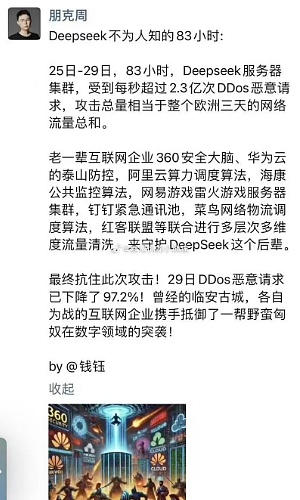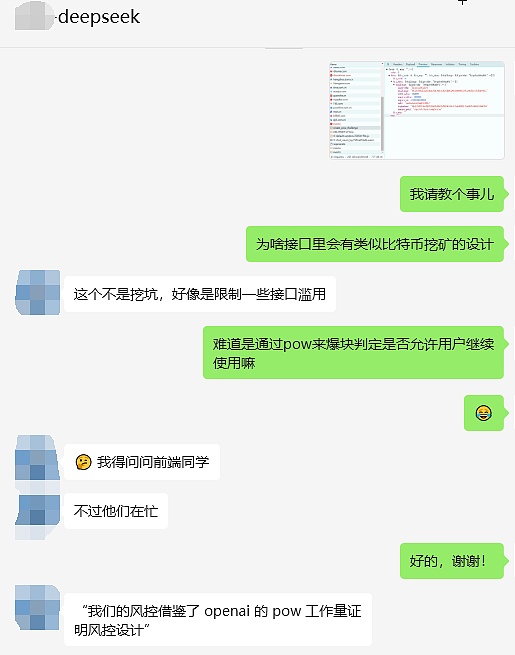Is DeepSeek still useful? As DeepSeek recovers from the high-profile DDOS attack across the internet, we found bitcoin in the interface requests of the resurrected DeepSeek. Let me tell you the story slowly.
Now, let me tell you the story.
1. DeepSeek was overwhelmed
DeepSeek is facing the largest DDOS attack.
It is reported that the peak traffic flow has exceeded 3.2Tbps, which is equivalent to tens of millions of devices "knocking on the door" simultaneously, causing its newly released R1 large model service to be down for nearly a day.
DeepSeek has weathered the storm. Whose credit is it?

Some say it is the joint efforts of the veteran internet companies like 360 Security Brain, Huawei Cloud's Taishan defense, Alibaba Cloud's computing power scheduling algorithm, Hikvision's public surveillance algorithm, NetEase Games' Leihuo game server cluster, Dingtalk's emergency communication pool, Cainiao Logistics' scheduling algorithm, and the Hacker Alliance, who have carried out multi-level and multi-dimensional traffic cleaning to protect the newcomer DeepSeek.
Please, don't believe this kind of flattering logic. Except for Zhou Hongyi who is still tirelessly trying to cash in on DeepSeek, I think the other big companies are probably just puzzled.
The "digital riot" behind this is actually a microcosm of the network security offense and defense battle - the attackers control the "zombie army" to launch wave-like requests, while the defenders need to find a way to break the deadlock in the competition of computing power and wisdom.
It's indeed a bit difficult.
But interestingly, the key to DeepSeek's breakthrough is not in the flattering articles, but in bitcoin.
2. Solid evidence
At first, I was just curious. After the recovery, DeepSeek's requests started to circle for a long time, and the computer's fan also started to run at full speed, which feels very much like the familiar bitcoin mining. Until I opened F12 and saw that DeepSeek's requests contained "create_pow_challenge", I realized that DeepSeek was using the PoW mechanism of bitcoin to fight against the DDOS attack.
Is it true? Let me ask DeepSeek's classmates.

It's true, not only DeepSeek is using it, but OpenAI is also using it.
So, why bitcoin?
3. The inspiration of bitcoin
The essence of a DDoS attack is to overwhelm the target system with a large number of invalid requests until the target system is overburdened and refuses service.
Traditional defense measures such as traffic cleaning and IP blocking, while able to alleviate the symptoms, are difficult to address the root cause - the attack cost is low, while the defense cost is high, like "using a fire hydrant to fight a flood".
DeepSeek's new strategy, on the other hand, borrows from the Proof-of-Work (PoW) mechanism of bitcoin. In simple terms, users who want to call the AI service need to first complete a computational problem (similar to bitcoin mining), and only those who successfully solve the problem can obtain the "pass". This design makes each request incur a real computational power cost, and the cost for attackers to launch large-scale attacks will increase exponentially.
What is the logic behind this?
Bitcoin uses PoW to ensure the security of the network: miners consume computing power to earn the right to record transactions, and attackers who want to tamper with the chain data need to control more than 51% of the network's computing power, which is far more costly than the benefits. DeepSeek has migrated this logic to the risk control field - attackers who want to forge a large number of requests need to pay the same computing power cost as real users, which will be economically unviable for them.
This is great.
4. The other side of the coin
DeepSeek's attempt reveals a trend: the underlying philosophy of blockchain is reshaping network security. The "economic game" thinking of PoW provides a new paradigm for combating distributed attacks - no longer relying solely on technical suppression, but designing mechanisms to make attackers "voluntarily give up".
Just as bitcoin uses decentralization to fight financial monopoly, DeepSeek uses computing power competition to fight against traffic floods. This may be the charm of technology: seemingly unrelated fields often hide the keys to solving problems.
Ultimately, the essence of security is not to build walls, but to make the cost of destruction higher than the benefits. And this "cross-border collaboration" between DeepSeek and bitcoin may be the best annotation of this logic.
May you have both DeepSeek and bitcoin.







